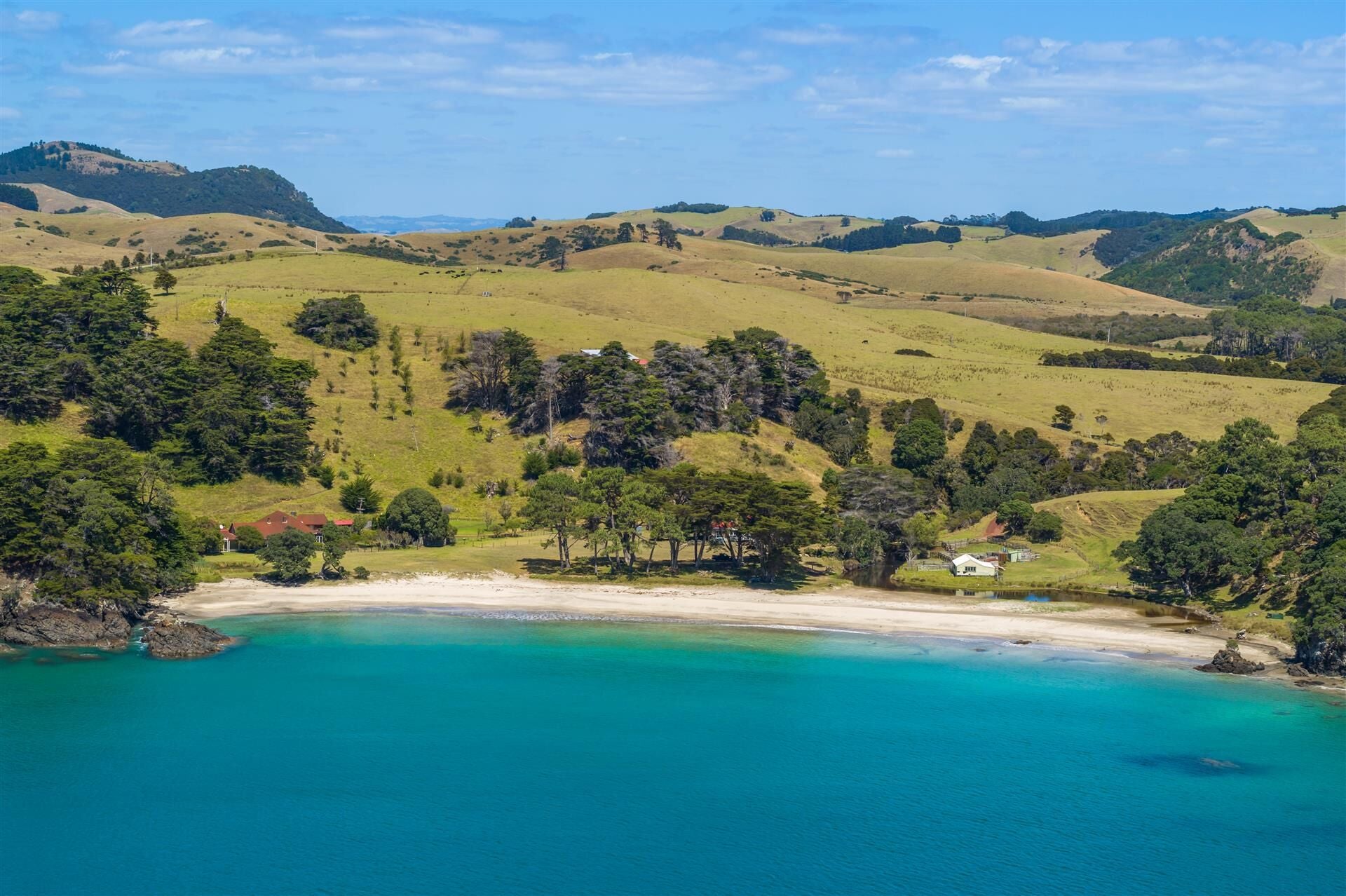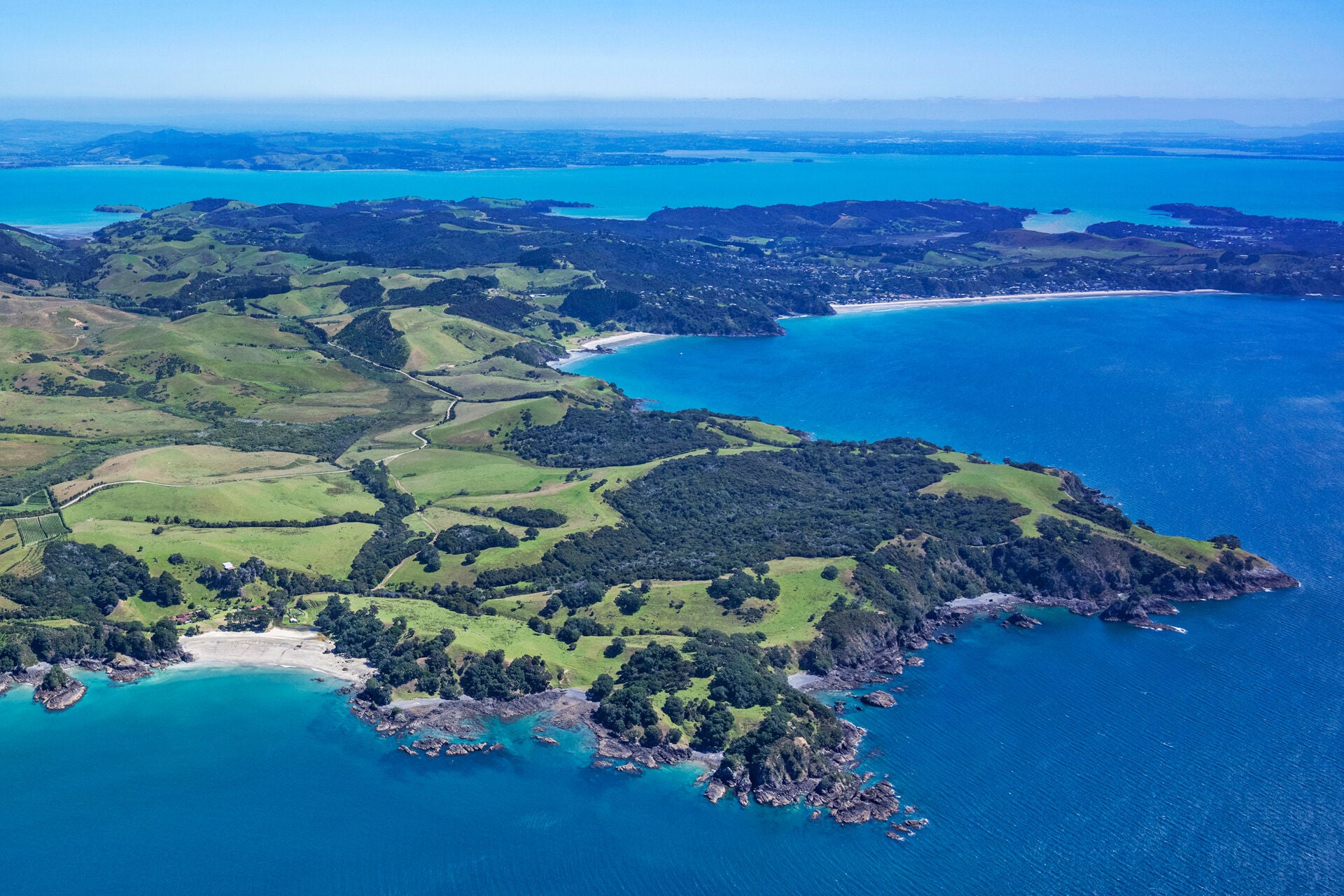Prime Waiheke coastal estate on the market for the first time in 50 years

The almost-300-hectare landholding surrounding Carey Bay is accessed off Man O’War Bay Road on the north-eastern side of Waiheke Island.
It includes headlands with uninterrupted Hauraki Gulf views, significant tracts of native bush and extensive frontage to more than five kilometres of coastline from Piemelon Bay in the west to the north-facing white sandy Carey Bay in the east.
Held in 16 titles with numerous prime building sites, the opportunity exists to retain the extremely private existing residence and working farm, or to further develop the comprehensive landholding into a pre-eminent gated farm park, golf course, resort, eco-tourism venture or multi-generational residential estate.
There are currently three dwellings on the property, including the original 1880s’ main homestead which has been extended and upgraded, along with farm buildings. There is approximately 150 hectares of effective farmland subdivided into paddocks with reticulated stock water currently operated under a grazing lease.
The balance of the land is made up of mature native forest (noted as areas of ecological significance), with regenerating stands of mānuka and kānuka and notable wetlands, while the headlands have pre-European significance with open pā sites, terraces, and pits.
The family circumstances of the current owners have changed, necessitating a sale. The property is being sold by way of Expressions of Interest closing 4pm, Thursday 8th April 2021 (unless sold prior).
Bayleys’ managing director Mike Bayley, said Carey Bay is, undoubtedly the most significant holding of coastal New Zealand land to come to the market in more than 20 years.
“A coastal property of this scale, so close to Auckland, is particularly compelling in light of the way 2020 unfolded around the world.
“The pandemic aftermath has seen people recalibrate and reassess many aspects of their lives, which throws this Waiheke property into sharp relief as a safe bolthole and an opportunity to create an enduring family legacy.”
Bayley said the uncertainties that COVID-19 has stirred up has reinforced, for many, the importance of family, a hankering for space and a greater emphasis on wellness and wellbeing.
“A well-resourced buyer could turn this Waiheke property – which is just a 10-minute helicopter flight or 45-minute boat trip from Auckland city – into a private, multi-generational family resort-style estate with individual titles streamlining succession plans and ownership structures.
“Family members could each have their own dwelling and land parcels without any feeling of encroachment on individual views or access.”
Equally, under the Hauraki Gulf Islands section of the Auckland Unitary Plan, there could be scope for further subdivision or boundary realignment to create an upmarket farm park which could offer significant parcels of land with good separation, views, and accessibility.
“The land’s contour, along with the tracts of mature native forest, provides a natural subdivision for numerous private outlooks amongst the multiple headlands with outstanding sea views and potential build sites,” said Bayley.
“New Zealand has several examples of luxury coastal farm park developments – Cooper and Company’s ‘The Landing’ in Purerua Peninsula, Bay of Islands, is one such project that has garnered support from high-net-worth individuals,” said Bayley.
“There is significant private wealth in New Zealand and this property represents an unrivalled opportunity for an ultra-high-net-worth-individual (UHNWI) to acquire this sensitive land and consolidate an enviable intergenerational estate.
“In its Wealth Report 2020, released before the pandemic outbreak, Bayleys global real estate partner Knight Frank estimated that New Zealand had 1,812 UHNWI – that is, those individuals with a net worth of more than US$30 million, including their primary residence.
“Based on data and projections, Knight Frank expects that number to grow by 37 percent in the next five years so there is unquestionably breadth and depth in the New Zealand market to support a property transaction of this magnitude.”
The Carey family from the Scottish fishing town of Arbroath, headed by patriarch and gentleman farmer William Carey, settled on this Waiheke land in 1871 building a home at Wairua Bay – now Carey Bay – in 1886.
They farmed the land, having a herd of shorthorn cattle for dairying and clearing forestry for a firewood business.
The original family owners became renowned for their welcoming hospitality to locals and visitors, with four generations of Careys calling the property “home” before it changed hands 100 years after the initial purchase.
Californians Philip and Diana Goldman bought the property under the name “Fountainhead” in 1971. The couple had some familial connections to New Zealand and businessman Philip, had an astute eye for real estate.
The couple initially split their time between Waiheke and California, until Philip stepped back from the family business in the States and they settled permanently on Waiheke extending the original Carey homestead with substantial additions made to the 1800s’ dwelling.
According to nephew Hugh Perkins, his Aunt Diana was the keen farmer of the pair, running sheep and buying in genetically-superior beef sires from Hawke’s Bay and demonstrating a progressive approach to farming.
Philip Goldman had three main passions in life says Hugh: the libertarian movement – hence the name “Fountainhead”, after a book of the same name by Russian-American novelist-philosopher Ayn Rand; railways, and spending time on this Waiheke property.
The property will now enter a new chapter after being in the custodianship of just two families since 1871.
Mike Bayley said under the terms of New Zealand’s Overseas Investment Office (OIO) legislation, the property is deemed sensitive land, however, given this country’s safe haven status, he expects enquiry and interest from offshore buyers.
“New Zealand’s peaceful and safe reputation, stable government, natural beauty, and lifestyle benefits are very attractive to offshore buyers, however – the thresholds to foreign ownership of land and existing residential properties to those other than New Zealand citizens are extremely high.
“This is particularly so for rural and/or coastal land and an offshore-domiciled buyer would need to satisfy the government that New Zealand’s national interest would be served and protected by any purchase and/or subsequent development of such land.
“The OIO bar is set high for a reason, however, due diligence could support potential for a resort, golf course development or other investment pathways that would employ New Zealanders and benefit the country’s tourism credentials and wider economy.”
Bayley said he expects significant interest from local New Zealanders who will recognise the once-in-a-lifetime opportunity to secure a property with this unique coastal scale and character.
